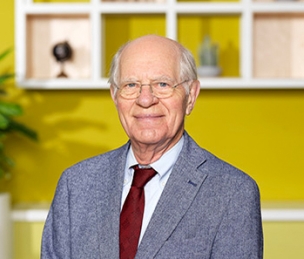Displaying 1 - 9 of 9
-
Levelt, W. J. M. (2020). On becoming a physicist of mind. Annual Review of Linguistics, 6(1), 1-23. doi:10.1146/annurev-linguistics-011619-030256.
Abstract
In 1976, the German Max Planck Society established a new research enterprise in psycholinguistics, which became the Max Planck Institute for Psycholinguistics in Nijmegen, the Netherlands. I was fortunate enough to be invited to direct this institute. It enabled me, with my background in visual and auditory psychophysics and the theory of formal grammars and automata, to develop a long-term chronometric endeavor to dissect the process of speaking. It led, among other work, to my book Speaking (1989) and to my research team's article in Brain and Behavioral Sciences “A Theory of Lexical Access in Speech Production” (1999). When I later became president of the Royal Netherlands Academy of Arts and Sciences, I helped initiate the Women for Science research project of the Inter Academy Council, a project chaired by my physicist sister at the National Institute of Standards and Technology. As an emeritus I published a comprehensive History of Psycholinguistics (2013). As will become clear, many people inspired and joined me in these undertakings. -
Levelt, W. J. M. (2020). The alpha and omega of Jerome Bruner's contributions to the Max Planck Institute for Psycholinguistics. In M. E. Poulsen (
Ed. ), The Jerome Bruner Library: From New York to Nijmegen (pp. 11-18). Nijmegen: Max Planck Institute for Psycholinguistics.Abstract
Presentation of the official opening of the Jerome Bruner Library, January 8th, 2020Additional information
Link to booklet - The Jerome Bruner Library: From New York to Nijmegen -
Brascamp, J., Klink, P., & Levelt, W. J. M. (2015). The ‘laws’ of binocular rivalry: 50 years of Levelt’s propositions. Vision Research, 109, 20-37. doi:10.1016/j.visres.2015.02.019.
Abstract
It has been fifty years since Levelt’s monograph On Binocular Rivalry (1965) was published, but its four propositions that describe the relation between stimulus strength and the phenomenology of binocular rivalry remain a benchmark for theorists and experimentalists even today. In this review, we will revisit the original conception of the four propositions and the scientific landscape in which this happened. We will also provide a brief update concerning distributions of dominance durations, another aspect of Levelt’s monograph that has maintained a prominent presence in the field. In a critical evaluation of Levelt’s propositions against current knowledge of binocular rivalry we will then demonstrate that the original propositions are not completely compatible with what is known today, but that they can, in a straightforward way, be modified to encapsulate the progress that has been made over the past fifty years. The resulting modified, propositions are shown to apply to a broad range of bistable perceptual phenomena, not just binocular rivalry, and they allow important inferences about the underlying neural systems. We argue that these inferences reflect canonical neural properties that play a role in visual perception in general, and we discuss ways in which future research can build on the work reviewed here to attain a better understanding of these properties -
Levelt, W. J. M. (2015). Levensbericht George Armitage Miller 1920 - 2012. In KNAW levensberichten en herdenkingen 2014 (pp. 38-42). Amsterdam: KNAW.
-
Levelt, W. J. M. (2015). Sleeping Beauties. In I. Toivonen, P. Csúrii, & E. Van der Zee (
Eds. ), Structures in the Mind: Essays on Language, Music, and Cognition in Honor of Ray Jackendoff (pp. 235-255). Cambridge, MA: MIT Press. -
Levelt, W. J. M. (1991). Die konnektionistische Mode. Sprache und Kognition, 10(2), 61-72.
-
Levelt, W. J. M. (1991). Lexical access in speech production: Stages versus cascading. In H. Peters, W. Hulstijn, & C. Starkweather (
Eds. ), Speech motor control and stuttering (pp. 3-10). Amsterdam: Excerpta Medica. -
Levelt, W. J. M., Schriefers, H., Vorberg, D., Meyer, A. S., Pechmann, T., & Havinga, J. (1991). Normal and deviant lexical processing: Reply to Dell and O'Seaghdha. Psychological Review, 98(4), 615-618. doi:10.1037/0033-295X.98.4.615.
Abstract
In their comment, Dell and O'Seaghdha (1991) adduced any effect on phonological probes for semantic alternatives to the activation of these probes in the lexical network. We argue that that interpretation is false and, in addition, that the model still cannot account for our data. Furthermore, and different from Dell and O'seaghda, we adduce semantic rebound to the lemma level, where it is so substantial that it should have shown up in our data. Finally, we question the function of feedback in a lexical network (other than eliciting speech errors) and discuss Dell's (1988) notion of a unified production-comprehension system. -
Levelt, W. J. M., Schriefer, H., Vorberg, D., Meyer, A. S., Pechmann, T., & Havinga, J. (1991). The time course of lexical access in speech production: A study of picture naming. Psychological Review, 98(1), 122-142. doi:10.1037/0033-295X.98.1.122.

Share this page